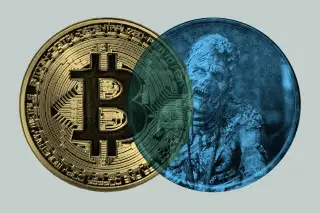The Surprising Personality Trait Shared by Bitcoin Lovers and 'Walking Dead' Fans

I'm a reporter for The Wall Street Journal and I write about bitcoin and zombies. I’ve traveled deep down the rabbit hole of both subjects for years. From Robert Kirkman, who created The Walking Dead, to your average bitcoin true believer, I’ve spoken to people in every walk of bitcoin and zombie life, and I’ve learned a few things about them. They have more in common than you might think.
For one thing, the success of both is due in some measure to the times in which they both came onto the scene. Bitcoin was unveiled in 2008, at the height of the financial crisis. The Walking Dead premiered in 2010, when millions of people were still suffering from the effects of the global recession brought on by that crisis.
Bitcoin was an alternative to the banking system that wreaked so much havoc, and people flocked to it. The Walking Dead’s story, ragged survivors fighting a zombie apocalypse, can be seen as a metaphor for people struggling against overwhelming circumstances, and yes people have flocked to it.
In both bitcoin and The Walking Dead, the individual is the supreme authority. Institutions exist in the past tense. Bitcoin was essentially envisioned as an alternative to a flawed financial system. Bitcoiners envision a future without middlemen, neither banks nor government inspectors. In the bitcoin vision, you are your own bank, and you control your own identity and personal data. In the pure vision of bitcoin’s decentralized future, the individual is the sovereign.
The Walking Dead portrays a world where all institutions have collapsed. Government, the law, religion, civil society, it’s all gone. People exist in what Thomas Hobbes deemed the natural state of man. In this world, the only right action is the one that keeps you alive. Any individual action can be justified, whether it’s Negan beating somebody to death with his bat, or Rick Grimes taking his vengeance on the cannibals of Terminus. In the land of the walking dead, the individual is supreme.
And this outlook attract a certain kind of person.
Now, you might think that the followers of an anti-government digital currency and fans of a dystopian zombie story would be composed of doomsday preppers, black-clad anarchists, and serious malefactors. To be sure, bitcoin has a place on the dark net, but the most surprising characteristic that I’ve found both share is this: optimism.
Both groups are, somewhat surprisingly, filled with optimists.
Bitcoiners truly believe they are helping build what will become a key foundation of a modern, 21st century, global, digital economy. To them, the nation-state has served us well for 500 some-odd years, but it can’t keep up with the demands of an increasingly global society. We have global media, global communications, and global commerce. It’s time to have a truly global currency and financial network as well.
(Also, with bitcoin up more than 300% this year, and its main rival ether up more than 3,000%, these wide-eyed dreamers have gotten rich off their magical internet money. That alone fuels a fair amount of optimism.)
Walking Dead fans tune into the show for the grisly special effects, and the spine-tingling “jump scares,” but they tune in for something else, too: watching their heroes endure against overwhelming, hopeless odds. The comic-book characters of The Walking Dead aren’t superheroes; they don’t have special powers. They aren’t elite soldiers, or savvy politicians, or powerful mobsters. They’re completely average people stuck in extraordinary circumstances, and in their week-to-week struggles, the audience can see something that looks like their day-to-day struggles.
The Walking Dead’s characters live through and endure inhuman conditions and tests, and come to exhibit a kind of extreme Stoicism that helps them cope with it all.
There is of course one aspect of these two things that will never meet: your bitcoin would not be any good to you in the zombie apocalypse. Oh, sure, there’s a company called Blockstream that operates a bitcoin satellite system, so if society does collapse, the bitcoin network ostensibly will still be transmitting.
Assuming you’ve got solar power or some independent energy source, you could conceivably still have access to your digital wealth.
But digital assets aren’t likely to do you much good in post-plague years. The only assets that will matter in the zombie apocalypse are physical assets: bullets, buildings, katana swords, and water.
Paul Vigna is the author of The Age of Cryptocurrency: How Bitcoin and the Blockchain are Challenging the Global Economic Order and Guts: The Anatomy of The Walking Dead, both out now.